Ragdoll cats are known for their striking blue eyes, silky fur, and docile nature, making them a popular choice among cat enthusiasts. However, like all breeds, Ragdolls have specific health issues that potential and current owners should be aware of. Understanding these health problems is crucial for ensuring the well-being and longevity of these charming felines. This article delves into the common health issues faced by Ragdoll cats, providing detailed descriptions, symptoms, and management tips.
Genetic Predispositions
Hypertrophic Cardiomyopathy (HCM)
Hypertrophic Cardiomyopathy is the most common heart disease in cats, including Ragdolls. This condition involves the thickening of the heart muscle, which can lead to heart failure.
Symptoms: Lethargy, difficulty breathing, rapid breathing, fainting, and sudden death.
Diagnosis: Veterinary examination, echocardiogram, and genetic testing.
Management: Medications to manage heart function, regular veterinary check-ups, and lifestyle adjustments.
Polycystic Kidney Disease (PKD)
PKD is a hereditary condition where cysts form in the kidneys, leading to kidney dysfunction over time.
Symptoms: Increased thirst, frequent urination, reduced appetite, weight loss, and lethargy.
Diagnosis: Ultrasound and genetic testing.
Management: There is no cure, but symptoms can be managed with a special diet, medications, and regular monitoring.
See Also: 6 Health Problems in Persian Cats
Common Health Issues
Obesity
Ragdolls are prone to obesity due to their laid-back nature and love for lounging around.
Symptoms: Excessive weight gain, difficulty moving, and increased risk of other health issues like diabetes and arthritis.
Prevention and Management: Balanced diet, portion control, regular exercise, and routine vet check-ups.
Dental Problems
Dental diseases are common in Ragdolls, often due to plaque and tartar build-up.
Symptoms: Bad breath, red or swollen gums, difficulty eating, and tooth loss.
Prevention and Management: Regular dental check-ups, professional cleanings, and daily tooth brushing with cat-safe toothpaste.
Urinary Tract Infections (UTIs)
Ragdolls can be prone to UTIs, which can cause discomfort and lead to more serious health issues if untreated.
Symptoms: Frequent urination, straining to urinate, blood in urine, and urinating outside the litter box.
Diagnosis: Urine analysis and culture.
Management: Antibiotics, increased water intake, and a urinary health diet.
Less Common Health Problems
Feline Infectious Peritonitis (FIP)
FIP is a serious and often fatal viral disease caused by a mutation of the feline coronavirus.
Symptoms: Fever, weight loss, abdominal fluid build-up, and neurological signs.
Diagnosis: Blood tests, fluid analysis, and biopsy.
Management: No cure, but supportive care can improve quality of life.
Gastrointestinal Issues
Ragdolls may experience various gastrointestinal problems, including food allergies, inflammatory bowel disease, and constipation.
Symptoms: Vomiting, diarrhea, weight loss, and changes in appetite.
Diagnosis: Veterinary examination, blood tests, and imaging studies.
Management: Dietary changes, medications, and regular monitoring.
Preventative Care
Regular Veterinary Visits
Routine check-ups are essential for early detection and management of health problems. Annual visits are recommended, but more frequent visits may be necessary for older cats or those with chronic conditions.
Vaccinations
Keeping up with vaccinations helps protect Ragdolls from common infectious diseases.
Core Vaccines: Feline panleukopenia, feline herpesvirus, feline calicivirus, and rabies.
Non-Core Vaccines: Feline leukemia virus (FeLV) based on risk assessment.
Spaying and Neutering
Spaying and neutering not only prevent unwanted litters but also reduce the risk of certain cancers and behavioral issues.
Nutrition and Exercise
Balanced Diet
A balanced diet is crucial for maintaining a healthy weight and preventing obesity-related issues. High-quality cat food tailored to the specific needs of Ragdolls, including age and activity level, is recommended.
Portion Control
Overfeeding can lead to obesity and related health problems. Follow the feeding guidelines provided by your veterinarian or on the cat food packaging.
Regular Exercise
Engaging Ragdolls in regular physical activities helps keep them fit and mentally stimulated. Interactive toys, climbing trees, and playtime are great ways to encourage exercise.
Grooming
Coat Care
Ragdolls have long, silky fur that requires regular grooming to prevent mats and tangles.
Brushing: Brush at least twice a week to keep the coat healthy and reduce shedding.
Bathing: Occasional baths can help maintain coat cleanliness, especially if the cat gets dirty or has a skin condition.
Nail Trimming
Regular nail trimming prevents overgrowth and reduces the risk of injury.
Conclusion
Ragdoll cats, with their gentle and affectionate nature, make wonderful companions. However, they are predisposed to certain health issues that require attention and care. By understanding these potential problems and taking proactive measures, you can ensure that your Ragdoll cat leads a healthy, happy life. Regular veterinary visits, a balanced diet, exercise, and proper grooming are key components in maintaining the well-being of these beloved felines.
Related Topics
10 Health Problems in Calico Cats: A Comprehensive Guide
Health Problems Commonly Seen in Himalayan Cats: A Comprehensive Guide
























